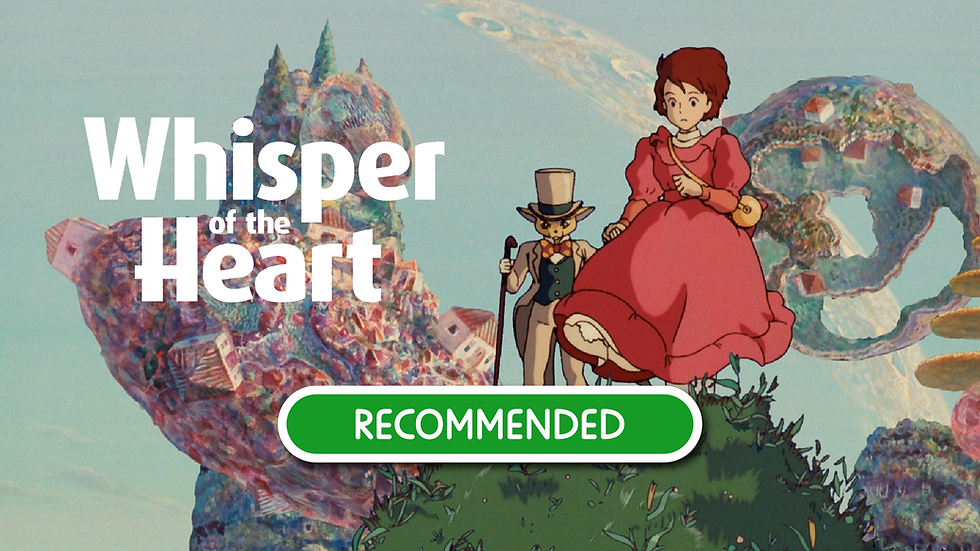Whisper of the Heart (耳をすませば) Review – Studio Ghibli is homeward bound.
- Tim C.

- May 16, 2020
- 4 min read
SPOILER-FREE REVIEW

Despite a jarring and awkward ending, Whisper of the Heart is a charming snapshot of teenage life and a stirring ode to the creative process.
Full disclosure before I get into the meat of this review: apart from Only Yesterday, Whisper of the Heart is the only Studio Ghibli film thus far that I’ve watched for the second time in order to write about it. I originally planned to release a review for this film a couple years back when we were first starting out on the site but at the time, the words to properly describe it eluded me and so I let it be. Ever since then, that rough first draft (I’m being generous, it’s roughly a third of a finished piece) has languished in my drafts folder, waiting as nearly two hundred of its fellows passed it by on their way to the great expanse of the Internet. It highlights a bad habit I have as a writer: a tendency to start but never finish writing. Now, I’ve opened this up again in the hopes of finishing it. It’s a curious coincidence, given that Whisper of the Heart is a beautifully animated ode to the writer’s process, and one that I’m sure a lot of creative people will enjoy.
This film tells the story of a Japanese schoolgirl by the name of Shizuku, who’s about to take her final middle school exams when she discovers that all the books she’s borrowed from the library were recently checked out by the same person: the mysterious Seiji Amasawa. Curious, Shizuku finds herself drawn down the proverbial rabbit hole in search of this mysterious person, and in so doing, discovers her untapped talent and passion for the art of creative writing.
As any fan of Studio Ghibli will tell you, the studio often trades in fantasy: whether it’s the magical world of spirits and other creatures drawn from Japanese mythology as seen in films like Spirited Away, or more mature musings on life with a fantastical edge to them as seen in films like Only Yesterday. Whisper of the Heart is no exception, though the fantasy it deals in is a more pedestrian kind of dream. At its core, there’s a wistful longing for the past: for school days, puppy love and a simpler life. It serves as a snapshot of those times, seeking perhaps to capture feelings and events that are only fleeting memories otherwise. Complemented by a particular fondness for Western culture that similarly marks a number of the studio’s works, with references to crafting violins and John Denver’s Country Roads, it’s a potent mix. As a young writer, I’m predisposed towards getting a little misty-eyed, though I wasn’t surprised at all to find that others have found it as compelling as I did.
It’s an evocative tale of a girl discovering her talent and passion, and going through the highs and lows of the life of a creative person. There’s an affection for the creative souls out there, though that’s not surprising. Animation after all is art, and the creative process exists for animators as it does for writers. Its characters are superbly well-drawn, from main characters Shizuku and Seiji to our side characters like Shizuku’s family and friends. Their interactions make them feel like genuine real-life people with hopes, dreams and fears. Truth be told there’s very little more than you can ask of a writer or a voice actor other than commitment and honesty, both of which are undeniably present here. There’s a particular intimacy between Shizuku and the audience, since we are as much her companions as the cheeky tabby cat she chases and befriends. We see snapshots of her life as a student and little sister, with little bits like when she eggs on a friend about a secret crush that have no bearing on the plot itself, but add to authenticity. The ending undercuts all this somewhat. To say what it is would be a spoiler, but naturally it’s the only point where the film ceases to be both honest and realistic. It’s undeniably awkward and bound to create mixed feelings for a movie that’s genuinely pretty good overall.
Regardless, its characters all inhabit a world I’ve never visited, and yet one that feels both real and familiar, because the film aims for what lies under its depiction of life in Tokyo during the 90s. Our characters only rarely if ever stop to acknowledge the beauty of it all, because to them it probably doesn’t seem all that special. But to the audience, a cramped apartment shared by four, or the communal working-class blocks and the day-to-day activities of their inhabitants are special. Ghibli’s recreation is meticulous, richly detailed and colourful, while the film’s accompanying score is appropriately soothing. Country Roads takes centre stage: an appropriate choice for a film about longing for simpler times.
It’s rare to struggle with a review for a movie with a message that’s meant to encourage and inspire its viewer to find something they’re passionate about and give it their all, and using writing as an example. The fact that I’ve managed to finish this review should say it all.







Comments